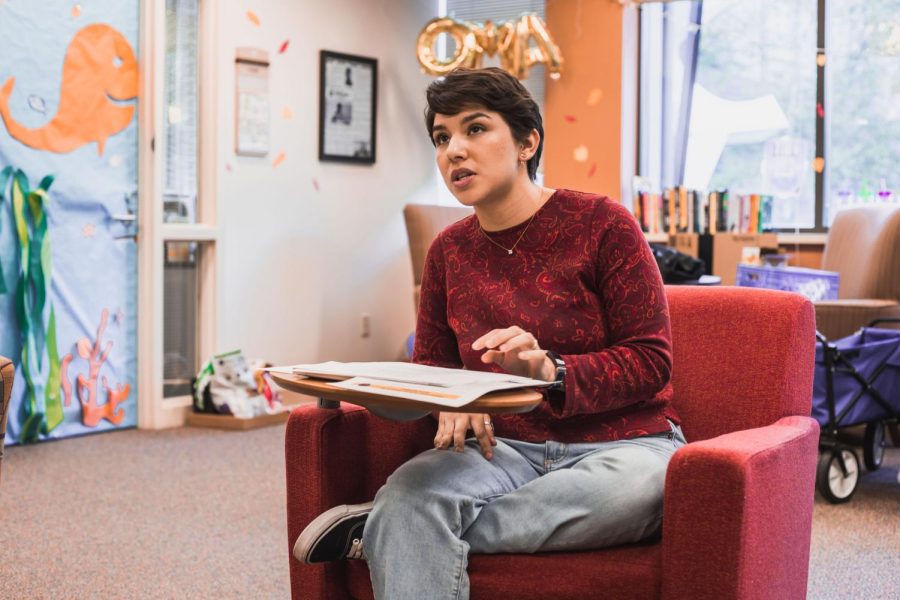Office of Multicultural Affairs Attempts to Spark Thanksgiving Dialogue
Gabby Rios leading discussion around Thanksgiving and why it is celebrated.
Seattle University’s Office of Multicultural Affairs (OMA) started OMA Speaks in 2015, merging POC Speaks and Queer Speaks together. Providing a space for meaningful discussions on identity, race and inclusion for students, staff and faculty is OMA’s goal for the series. Thursday, Nov. 17, they hosted an event about the forgotten aspects of Thanksgiving.
Gabby Rios, the graduate program director at OMA, led the conversation on Thanksgiving.
“I felt this topic was important to host since it is Native American and Indigenous Heritage Month, and Thanksgiving is coming up,” Rios wrote to the Spectator.
Leading up to the OMA Speaks event, I had no expectations for the amount of attendees; however, finding out that only one other person besides Rios and I came was surprising. I was the only person to show up who did not work at OMA.
Rios never holds expectations for attendance, but is working to make information about future events more accessible.
“I am working on creating an Instagram graphic that summarizes the takeaways so people can learn asynchronously,” Rios wrote.
Despite the low attendance, the intimate feel allowed for an authentic experience that would have been lost if more people showed up. This event was designed to be discussion-based to allow for all perspectives to be heard.
Grace Nguyen, a third-year cell and molecular biology student at Seattle U, enjoyed the opportunity to attend the event and have the time to think about the topic between her busy schedule. Nguyen was pleased by the opportunity to participate in a major topic of discussion during the event.
“I get frustrated with the land acknowledgements because there is no further action taken, so I appreciate that we were able to brainstorm some possible next steps,” Nguyen said.
Rithikaa Prakash, a second-year computer science major, is the office assistant at OMA. While she was unable to attend the event, she agrees with Nguyen when it comes to land acknowledgments.
“We wouldn’t have jobs, homes or our school campus without land to put it on, and it’s important to acknowledge the history of the land and the people it was taken from; we need to understand why we are able to have what we have on the land that we occupy,” Prakash wrote.
A central point of the event was the flaws present in American educational structures. Specifically with Thanksgiving, myself and the other attendees were only taught about it in elementary school, where we learned a simplified version of the holiday’s complex history.
Prakash thinks that education on Thanksgiving has evolved over the years, but agrees that major changes must happen for the school system to be improved.
“All sides of the story must be told and acknowledged so that we can truly understand the history and implications of the holiday,” Prakash wrote to the Spectator.
Even though Prakash was not in attendance, she believes that creating a safe space for everyone can make Thanksgiving more inclusive. She values gatherings like Queer Friendsgiving as they do exactly that.
“Everyone deserves to celebrate the things and people they are thankful for in a space where they feel supported,” Prakash wrote.
To end the discussion, we shared our personal experience with the upcoming holiday. Being from different backgrounds, it was eye-opening to discover how different students celebrate and treat Thanksgiving.
Rios tends to spend her thanksgiving away from family, but she enjoys the time to reflect and honor the Indigenous people local to them.
“There is no shame in celebrating the holiday, but it’s important to take a step back and think about where these traditions and narratives stem from,” Rios wrote.
Nguyen differs in how and who she celebrates her Thanksgiving with, and feels that some of the positive spirit of the holiday can be preserved despite a dark history.
“It’s a good time to get together with family,” Nguyen said. “In my family we don’t see it as solely colonization, but I do see it as a good way to be reflective and grateful.”
By the end of the event, I felt closer to these two community members and more educated on the historical and current issues with Thanksgiving. It is an integral first step for one to be aware of their privilege and how that impacts others.




